- Home
- Anthony Doerr
The Best American Short Stories 2019 Page 3
The Best American Short Stories 2019 Read online
Page 3
“Class, please scroll to chapter forty-one and take it in,” Mr. Harper says. The class touches their note-screens. The chapter is thirty-eight pages. I don’t even try to read it. I look at some chapter videos of people doing things they used to do: a man throws three balls into the air, a woman in a dress spins on one leg. After three minutes, the class is done reading the chapter. Their SpeedRead™ chips make reading easy/quick for them. SpeedRead™ lets optimized people take in words faster than I can hardly see them. Since I’m a clear-born, I look while they read. I will read the chapters on my own later. But even staring at the videos and pictures is better than some can do. Samantha can’t hardly look at her screen. And then there’s Nick and Raphy, who are the class shoelookers. All they do is cry and moan. They were both optimized and still became shoelookers. Being emotional is all they are, and it means they aren’t good for anything. I’m glad Samantha and Nick and Raphy are in the class. Because of them, I’m not bottom/last in learning, and I don’t wanna be overall bottom/last at all.
After the others have read the chapter, Mr. Harper goes back to talking about how untrue the lives people used to live were. We’ve all heard about the times before the Turn, but hearing Mr. Harper, who is a teacher and, hopefully, not a complete ass/idiot, talk about all the untruths people used to think were regular makes me proud to be from now and not then. Still, I mostly only half-listen ’cause I’m thinking.
When the horn goes off and it’s time for rotation, I hang back so I can speak truth to Mr. Harper.
“Mr. Harper,” I say.
“What, Ben?”
“Today, during a lot of your session, I was thinking about beating you to death with a rock.”
“Hmm, why?”
“I don’t know. I’m not a brain-healer.”
“If you don’t know, how would I? Go to the nurse if you want.”
I walk toward the nurse’s office. On the way there, I see three shoelookers together in front of one of our school’s war monuments: a glass case holding a wall with the nuclear shadows of our dead enemies on it. Two of the shoelookers cry, and the third paces between the other two, biting his nails. Marlene is near them. Marlene is my sibling. She is five cycles older than I am and training to be a NumbersPlusTaxes teacher.
Marlene is also the reason I was not given a prebirth optiselection. When Marlene was optiselected, all her personality points attached to only one personality paradigm and made her a para-one, a person who’s only about one thing. There are all kinds of paradigms, like intelligence, conscientiousness, or extraversion. OptiLife™ releases different personality packages people can pay for. My parents were successful enough to get a standard package of seven points to spread across a few paradigms. That’s what they wanted for Marlene: a balanced, successful person. But all seven of the points that could have gone toward her being a bunch of different stuff all went to one paradigm. Ambition. And that much of anything makes you a freak/the worst. But some companies like Learning Inc. prefer people like Marlene. She is a good worker. She is good at getting things she wants. It’s all she does. Get things.
When Marlene was six and I was still a crying bag of poop, my parents had to convince her that having a younger brother would actually help her to be a good teacher because she could practice information transfer on me. They also told her that I, as a clear-born, could never be in competition with her in life or their hearts after they caught her trying to smother me with a pillow. They tell that story and laugh about it now.
After Marlene, my parents decided optimizing me wasn’t worth the risk. When I was younger, she used to force me to read books for hours. She tried to make me remember things, and when I couldn’t, she would slap me or pull my hair or twist my fingers. When I cheated and she didn’t notice, she would hug me and squeeze so tight I couldn’t breathe. She’d kiss my forehead. When I got old enough to really be in school and didn’t do well there either, Marlene gave up on me. “No one can make a diamond out of a turd,” she said.
“Got it, Marlene,” I said.
“Diamonds are actually made from—”
“I don’t care, Marlene.”
I’m proof she isn’t the perfect teacher, and she hates me for it.
How I feel about Marlene: she could keel over plus die and I’d be happy plus ecstatic.
She has two cups of water in her hands. She looks at me quickly, then pours a cup of water onto the heads of each of the crying shoelookers. Wet the Wetter is a game people play with shoelookers sometimes. People like to trip them or pour water on the heads of criers ’cause they won’t do anything back and it’s humorous. The two shoelookers are crying harder than ever now but not moving. Water drips, drips from their heads and clothes.
“Ben,” Marlene says. “Isn’t it your lunch section?”
“Yes,” I say.
“This isn’t the food sector.”
“I understand.”
“I am inquiring because your ability to move effectively through an academic space reflects upon my own person,” Marlene says. I look at the empty cups in her hands.
“I am me and you are you. I don’t care what reflects on you,” I say.
“You know this school will be mine in the future,” she says. “Even you should understand that.” Marlene always talks about how she will take the school over, how she’ll be such a good teacher that everything will be hers.
“OK. Don’t talk to me,” I say loudly. “Para-one,” I say much more softly because she’s scary. Marlene comes close to me. The shoelookers drip. The dry one paces back and forth.
“What’d you say?” Marlene asks. I don’t say anything. I look at her eyes that always look the same, always searching for something to push over and stomp. Marlene backs off and lets me go. She walks away laughing at the wet shoelookers, and at me, I guess.
Shoelookers don’t really do anything to anybody except make them proud to be themselves and not a no-good shoelooker. People say that if you tell a lot of lies you eventually start being all depressed and weepy like them. The shoelookers don’t feel anything but sad. They feel it so much you can see it in everything they do. They’re always looking at the ground.
I walk to the nurse in big steps. Everybody gets their mandatory Good in the mornings with breakfast at school, but they have extra at the nurse’s. I go to the nurse because Good makes me feel good. When I have Good, it’s easy to be proud and truthful, and ignore the things that cloud my truth, like Marlene, or being made into an example, or knowing I’ll never be perfect.
The nurse, Ms. Higgins, is shaped like an old pear. Her body type is not attractive. She isn’t in a union and doesn’t have any kids because she’s ugly and works as a school nurse. Today her face looks tired plus more tired. I prefer Ms. Higgins. Ms. Higgins looks at me, pulls her injector from her desk. There are vials of fresh Good on a shelf behind her.
It’s quiet, so I talk. “Why don’t you quit if you hate it here so much?” I ask as she screws the Good into the injector gun.
“Because I need credits,” she says. She steps to me. I stretch my neck out for her and close my eyes. She puts one hand on one side of my neck. Her hand is warm plus strong. She stabs the injector needle in. My head feels the way an orange tastes. I open my eyes and look at her. She waits. I look at her more. She frowns, then gives me another shot. And then I feel the Good.
“Bye,” I say to Ms. Higgins. She sweeps the air with her fingers, like, Be gone.
On the way to my usual foodbreak table, I walk past a table of shoelookers whispering to themselves. A few are crying. Shoelookers—if they’re good for anything, it’s crying. I laugh ’cause the Good is going full blast and it’s funny how the shoelookers just don’t have a chance. How they’re so down that even Good doesn’t help them much.
At my table, Scotty, John, and some others are laughing, but I don’t know why, so I feel mildly frustrated.
“Oh, hey, Ben. We were so worried. Please have a seat,” says John. I sit down next to him
. “How are you feeling today?” Scotty asks, and I feel even more frustrated ’cause I think they’re using me for humor because I needed extra Good instead of just the mandatory breakfast Good. “We care,” Scotty says, making his voice like a bird. The table laughs. I look around, then I relax ’cause I catch on to things, and I can see that they’re making fun of how things used to be, not me.
“Why, thank you for asking,” I say. “I’m doing great.” They laugh more, and it feels great. All the laughing at the table.
“Please take my drink because you look thirsty and ’cause you’re a really smart guy,” Scotty says, and everybody laughs even harder. “Catch, Ben,” Scotty says as he tosses a box drink. I don’t move to catch it fast enough ’cause I’m thinking, I just got Good from the nurse, and already I’m feeling things other than good, which isn’t how it works.
The drink box goes over my hand and smacks Leslie McStowe right in the head.
She drops her tray and her food. Leslie frowns. I laugh with everybody else. Leslie was a twin, then her brother, Jimmy, died. Jimmy was a shoelooker who cooked his head in a food zapper. Leslie is always telling lies about how great things are or how nice everyone looks and how everybody is special. Leslie McStowe is one of the least truthful people around, which is frustrating because she and I scanned high for compatibility on our genetic compatibility charts. Probably because we’re both clear-borns. Leslie’s parents have protested against OptiLife™. They don’t believe in perfect. I believe in it—I just hate it.
Leslie stands there looking lost and stupid. I want more laughs, so I stand up and make my mouth a big huge smile, and say, “Sorry about that, Leslie, let me use my credits to get you a new lunch.” The table goes crazy. I have a lot of credits because my mother and father are successful, which I benefit from. Leslie’s face goes from Ow to all smiles as she looks at me. Then she says, “That’s so nice of you.” It’s a surprising thing to hear ’cause no one has said it to me before. The table is wild/crazy, which makes me proud. I keep it going. “C’mon, let’s get you another lunch,” I say in a voice I imagine would have been regular a long time ago.
Leslie McStowe follows me into the food part of the cafeteria. “Those people are idiots,” my mother said once. She wasn’t talking about the McStowes specifically, but about a bunch of people who were giving away candy and flowers to strangers on the newscast. The McStowes and the people my mother called idiots are part of the Anti. They’re anti-Good, anti–prebirth science, anti-progress. At my school I can count the number of Anti families on my hands. But there are a lot of them in worse parts of the New Federation.
“Get whatever you want,” I say, even though the guys at the table can’t hear me over here.
“Thanks so much!” Leslie says. When she smiles, it looks like somebody scooped holes in her cheeks ’cause of her dimples. She grabs a juice and a greens bowl, and that’s it. I register my credit code into the machine for her, and she smiles at the lunch man, who doesn’t say anything. “Have a great day,” I say to him because I’m still doing the thing I was doing. He stares. When we come back to the main part of the cafeteria, I’m expecting a bunch of laughs. No one at the table notices. They’re eating now. I feel frustrated.
“Thanks, Benny, you’re such a sweetie,” Leslie says. I want to let her know the whole thing was for laughs, but then I don’t, because I’m thinking. I sit down, and Leslie goes to sit with the shoelookers though she herself is not a shoelooker. I think, Maybe I should have been truthful and reminded her about the fact that her face is arranged nicely, so she would remember we scanned as compatible and might eventually be part of a workable, functional familial unit with me.
Everybody has their own room in our housing unit. I have a mother and a father, and there’s Marlene. In my room I do physical maintenance like push-ups and leg pushes, and then I read the chapters from school until I smell food. I go downstairs where my mother and father and sibling are all at a table chewing.
“What are you looking at me for?” I ask.
“I received a message saying you’ve been taking extra Good,” my father says.
I take a bowl from the washer, and I push the button that makes the cooker front slide open. I put a spoon in. I feel the hot inside the cooker box. I fill the bowl with meat and grains from the cooker. “Sometimes I need it. And why aren’t you being truthful?” I say. “Marlene told you that.” Marlene, since she’s training at the school, knows stuff about me and what I do there.
“Don’t accuse anyone of not being truthful,” my mother says.
“I obscured the full truth because you have a tendency to respond emotionally, like some kind of neck-crane,” says my father. Standing and staring at them, I dive my spoon into my bowl. I take a bite and chew. The grains and meat taste like grains and meat.
“I only pay attention because people still associate me with you,” Marlene says. “Once I’m certified, I won’t be interested. Until then, you are still a periphery reflection of my person.”
Sometimes I imagine Marlene drowning in a tank of clear water.
“OK, I’ve listened to you and now I’m frustrated,” I say.
“We are also frustrated because people still associate you with us even though we are our own successful individuals,” my mother says.
“Not to mention the fact that your clear-birth was a mistake and that you are alive only due to your mother’s irrationality brought about by maternity,” my father says. My mother looks at me, then my father, and then nods her head. “It’s true; it’s true,” she says.
I drop my food on the floor and walk away. The bowl doesn’t break. The food splats on the floor.
“Have some pride, Ben,” my father says.
“You always say the same things. It’s frustrating,” I say from the hall so they can’t see me. I squeeze my eyes shut so no water can come from them. I try to have some pride. “I know I was a mistake already, so I don’t know why you mention it so often.”
“It’s because the fact that we didn’t select genes during your prebirth period almost certainly correlates to your being so slow and disappointing,” my father calls. “And we’re frustrated with you and tangentially with ourselves as a result.”
“I know all that,” I say. I go to the bathroom. I grab the house injector from behind the mirror. I go to grab a vial of Good. There is none. I spin around like it will be in the air somewhere. Then I take a breath and close my eyes and close the mirror. I open it again slowly, hoping it will be different. It isn’t. There is an injector but no Good. I want to scream but don’t. Instead, I go to my room. I sit on the bed.
I try to sleep. All I do is sweat and feel hurt all around my body and in my head. It gets dark. By then, I feel like death/poop. Deep into the night, my mother comes into the room.
“You’ve been screaming,” she says.
“I don’t care if I’ve been disturbing you; I’m frustrated you hid our Good,” I say from under the covers. I hear her step to me; she rips the covers away. She is frowning in the dark. She puts a hand on my face and turns it. Then she uses the injector in her hand and stabs it into my neck. She gives me three shots, and the Good makes my teeth rattle. My mother’s hand sits on my head for a while. Then she turns and leaves. And then everything feels so right and so fine that I fall asleep smiling.
At school I get my usual morning Good. And in HowItWas class we talk about before again.
“So even though people said all these things and acted like everyone else was important, there were still wars and hurting, which proves it was a time of lies,” Mr. Harper says.
“But yesterday you said some frog crap about how some things were better and how it was easier in the old days,” Scotty says.
“This is why you’ll be a midlevel tasker at best,” Mr. Harper says. “I said some people still believe that the old way was better. Some people still live the old way because they prefer it.”
“I think those people are assjerks,” Scotty says.<
br />
“No one cares what you think,” Mr. Harper says. “Though I agree with you.”
“H-how dow know?” says Samantha in her deep, broken voice. She is normally quiet. “Mahbe OK.”
“Shut up, screw-face,” Scotty says. He takes off his shoe and throws it at Samantha. It hits her and makes a thunk sound and then bounces off her head onto my desk. The class laughs. Mr. Harper laughs. Samantha tries to laugh. I stare at the shoe.
“See, here we have a teachable moment,” Mr. Harper says. “Back before the Turn, Scotty might not have been honest about how he expressed himself, and Samantha would go on thinking he thought what she said was smart.”
I go straight to Ms. Higgins after class. When I get there, she looks at me like I’m broken.
“You’ve been put on a Good restriction by your legal guardians,” she says. I can see the vials behind her. I can almost feel them. Almost but definitely not.
“I only need two,” I say. “Even one shot, please.”
“A formal restriction has—”
“I know,” I yell. I turn around and leave.
The floors of the school are tan and white. I walk to lunch. It is hard to keep my head up ’cause I don’t feel proud or good at all.
When I get to the cafeteria, I hear someone say, “Happy birthday.” When I look up, I see Leslie McStowe looking at me. She’s sitting at a table with a bunch of sorry shoelookers. Then she stands and wraps her arms around me. “Happy birthday,” she says again. I used to hide in my room and try to remember everything from whatever Marlene had given me to read so I could get a hug like that after her tests. But this is the first one I’ve had in many cycles. I’m standing there thinking of how Leslie McStowe is strong plus soft. I can feel her breathing on my neck a little.

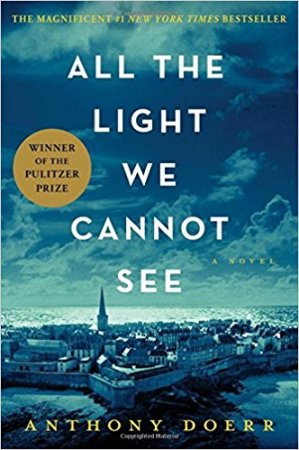 All the Light We Cannot See
All the Light We Cannot See About Grace
About Grace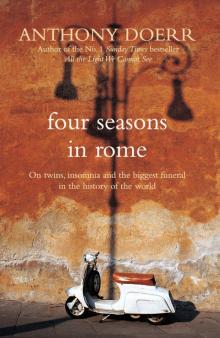 Four Seasons in Rome: On Twins, Insomnia, and the Biggest Funeral in the History of the World
Four Seasons in Rome: On Twins, Insomnia, and the Biggest Funeral in the History of the World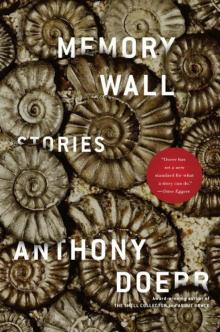 Memory Wall
Memory Wall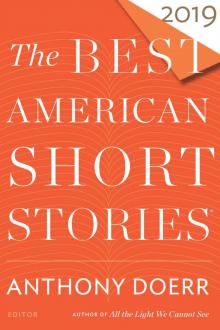 The Best American Short Stories 2019
The Best American Short Stories 2019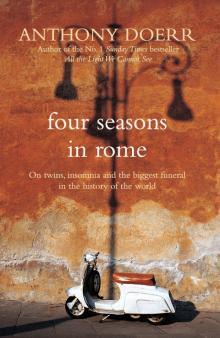 Four Seasons in Rome
Four Seasons in Rome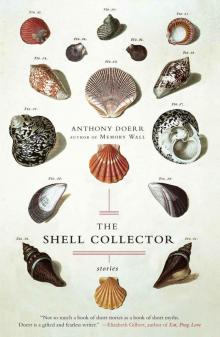 The Shell Collector
The Shell Collector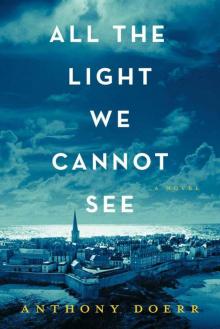 All the Light We Cannot See: A Novel
All the Light We Cannot See: A Novel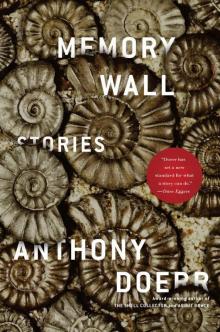 Memory Wall: Stories
Memory Wall: Stories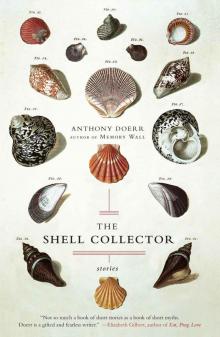 Shell Collector
Shell Collector